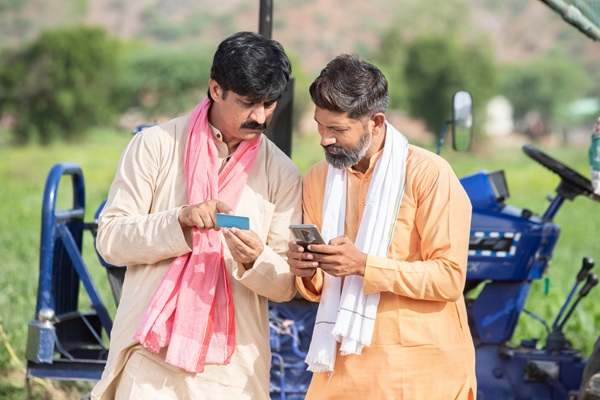.png)
Ten Digits That Quietly Steal Freedom
From Punjab’s fields to Delhi’s malls, a mobile number has become the key to convenience and a quiet surrender of privacy.

Kalyani Srinath, a food curator at www.sizzlingtastebuds.com, is a curious learner and a keen observer of life.
August 23, 2025 at 8:29 AM IST
Seventy-eight years after independence, the symbols of freedom still stand tall, yet the substance often slips away in the smallest of moments. Flags rise, anthems play, speeches ring out, but away from the podiums, citizens quietly hand over pieces of their identity for a little convenience, a minor discount, or to keep a queue moving.
Freedom was meant to ensure control over one’s choices. Independence was meant to protect dignity and autonomy. Yet in an age of instant billing, QR scanning and OTP verification, fragments of that autonomy are traded so routinely that the loss barely registers.
Number Please!
Dawn stretches over a mustard field in eastern Punjab. Raghunath, a wiry farmer in a faded kurta, pedals his rusting bicycle along a dusty road to the village bank, a file of papers tied with fraying red string balanced on his carrier. It’s subsidy payout day.
Inside, ceiling fans stir the heavy air. The clerk glances at Raghunath’s documents and asks, casually: “Mobile number?”
He hesitates—he’s heard of neighbours getting strange calls after such visits, but the queue is long, the official impatient. Ten digits leave his lips.
Outside, the Tricolour flutters atop the panchayat building, snapping in the wind—a bold emblem of sovereignty on a morning when a slice of his own sovereignty has quietly changed hands. The irony is hard to miss: 78 years after throwing off imperial control, it is still alarmingly easy to part with one’s identity.
In a crowded Delhi supermarket, the cashier scans your groceries, then pauses:
“Number, please.”
You hesitate. Her smile cools. “We can’t generate the bill without it.” People in the queue shuffle impatiently. You surrender the digits. Two days later, a caller offers “exclusive deals” from a brand you’ve never shopped with.
In a glossy Mumbai salon, a festive discount hinges on an OTP to your phone. Decline, and the offer disappears.
At a cousin’s wedding in Lucknow, a planner uploads your guest list for RSVPs. Days later, a catering service you’ve never contacted is pitching “premium packages” on WhatsApp.
Small, seemingly harmless moments, but each one a tiny surrender of something once fiercely personal, traded for convenience or to keep the transaction smooth. Over time, they start to resemble an unspoken trade of liberty for ease.
In a small town in Madhya Pradesh, Ramesh goes to the only pharmacy for his father’s medicines. The shopkeeper opens a ledger, not for inventory, but to note his name, Aadhaar, and mobile number “for safety.” No further explanation. Refusing isn’t an option in a place where goodwill is currency.
In a village outside Bhubaneswar, farmers applying for loans give both Aadhaar and phone numbers, often their only numbers, tied to bank accounts, ration cards, pensions. Days later, seed company offers arrive, suspiciously well-targeted.
In semi-urban Rajasthan, tea seller Rajinder registers his number to keep his QR code working. Now, business loan calls come almost daily.
Here, the trade-off isn’t optional. Say no, and the service itself might vanish. Independence may be equal in name, but the ability to protect identity is not.
A mobile number is no longer just a way to call. It links to Aadhaar, bank accounts, UPI wallets, insurance policies, PAN, and government benefits. It can map your spending, track your location, and sketch your habits.
Yet it’s given out casually, scribbled in registers or typed into billing systems. The danger isn’t visible in the moment. But once those digits enter another network—digital or otherwise—they can move in ways you’ll never know.
Refusal, meanwhile, can feel awkward, even suspect. Convenience makes compliance seem natural.
Money & Identity
On paper, the Digital Personal Data Protection Act, 2023, promises consent, purpose limitation, and the right to reclaim your data. In practice, those rights are rare at the actual point of collection. At the supermarket, no consent form. At a rural bank, no explanation. At a tea stall, no record of “registration.”
The law is new, but the culture of casual data-taking is old, deeply embedded in marketplaces, government offices, and social norms.
In metros, the affluent can buy privacy—secondary SIMs, premium apps, legal recourse if needed. In small towns and rural belts, there is no such shield. A single number connects everything: money, identity, family.
The risks are tangible. A Jharkhand schoolteacher registers students for an online exam, including parents’ phone numbers. Weeks later, those parents get calls selling coaching classes, with exact details about their children. Someone, somewhere, has sold or passed on that data.
Independence was fought for with visible sacrifice. But freedoms are also lost in silence,in a ledger entry, a sign-up form, a QR code’s backend.
In Connaught Place. In a Chhattisgarh mandi. In the smallest panchayat office. The scene repeats itself:
A form pushed across the counter. A pen offered. A voice, level but polite:
“Number, please.”
Ten digits slide across, easier than protest, lighter than resistance. The flag still flutters, the anthem still plays, the Tricolour still rises. But if we no longer control the simplest outlines of who we are, what is left of the freedom those symbols stand for?



